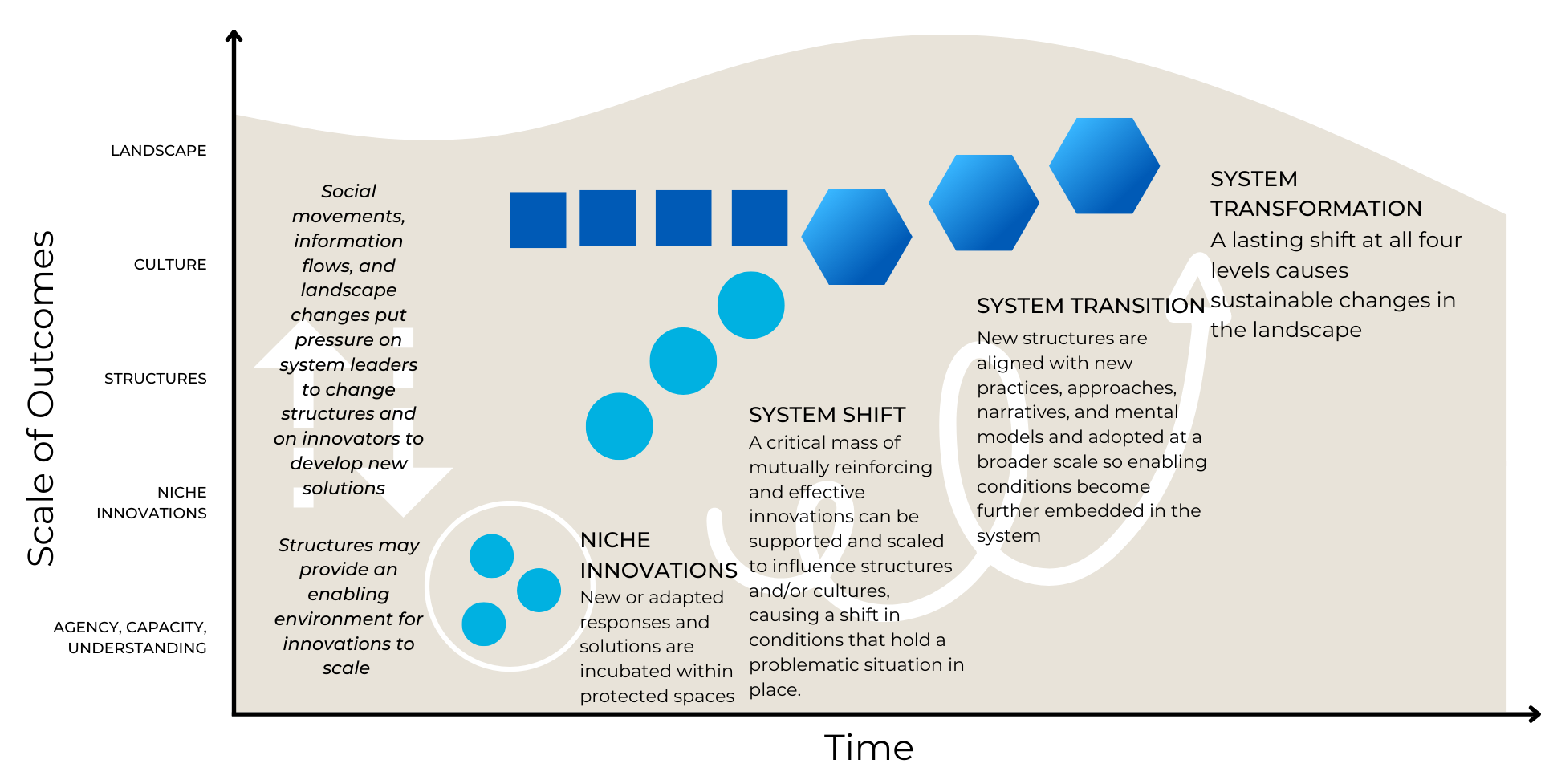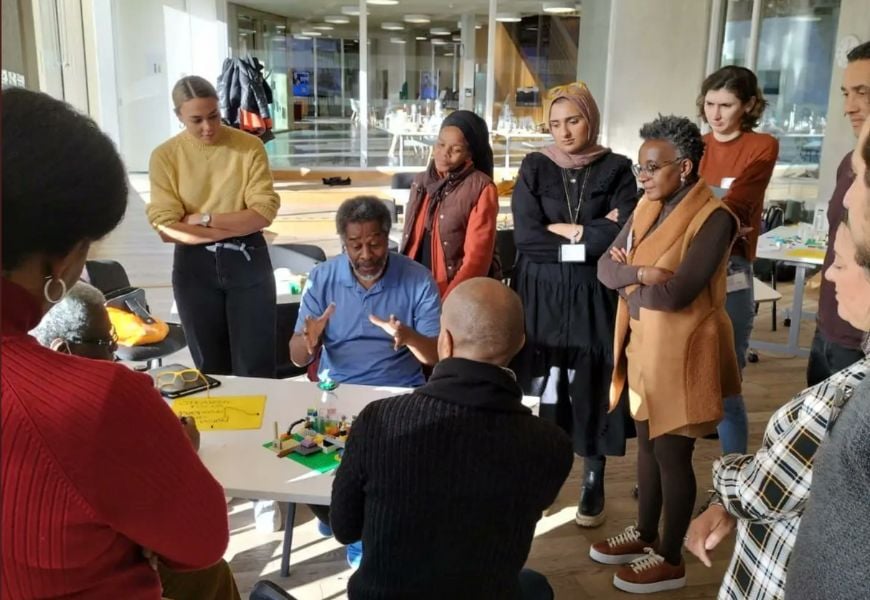In an ever-evolving world marked by complex challenges, the need for system transformation has become increasingly apparent. From addressing climate change and the energy crisis to dismantling colonial and systemic barriers for Indigenous rights and advancing racial equity, the imperative to rethink and rebuild our systems has never been more critical. However, as we embark on the journey of systems change, it becomes abundantly clear that this monumental task cannot be accomplished in isolation. Collaboration is imperative in order to bridge the gaps, unite stakeholders, and catalyse collective action.
This article explores the urgent need for systems change and collaboration in the decisive decade, shares our theory of change, and how to bridge the collaboration gap for system transformation.
Starting with impact: The decisive decade
When we talk about impact, it's vital to begin with an external perspective and examine the world around us. The 2020s have been labelled as a decisive decade, characterised by an urgent need to establish dignity, peace, and prosperity within the confines of our planet's natural resources.
This urgency aligns with globally recognised milestones like the Sustainable Development Goals and the Paris Climate Agreement, both setting a target date of 2030. Whether or not you fully embrace the notion of 2030 as a deadline, it's hard to ignore the presence of what many call a "poly crisis" – an intricate web of intersecting crises.

Our world is beset by an urgent call to balance social, economic, and environmental imperatives. Achieving a sustainable future demands nothing less than a profound transformation of societal systems, spanning energy, food, finance, justice, development, and security.
Understanding systems change: 5 levels of impact
When we delve into systems change and transformation, some may argue that it's an abstract concept. Do we truly comprehend what it entails? At Reos, we've dedicated significant time and effort to articulate what systems transformation means to us. Our ongoing experience in this field has culminated in a well-defined theory of change, which offers a useful framework for understanding systems transformation.
Our theory of change was developed by our global evaluation team with the support of Mark Cabaj from “Here to There Consulting” and draws on the work of Frank W. Geels, Professor of System Innovation at the University of Manchester. It’s built around different scales of outcomes and has 5 levels of impact, which we expand on below:
- Agency, capacity, relationships and understanding
- Niche innovations
- System shift
- System transition
- System transformation

A diagram illustrating the Reos theory of change.
Level 1: Agency, capacity, relationships and understanding
Our processes consistently build cross-system relationships and enhance the agency, capacity, and understanding of social innovators, changemakers, and system leaders to address complex problems with a systemic approach.
This applies individually and collectively (e.g. at the level of teams, organisations, networks). The collective level involves the depth of trust, connection, shared understanding, and collaborative practice. Leadership is always a leverage point in any system, and building relationships across silos shifts the interconnections of a system.
While this change may appear indirect, it holds immense potential to ripple through the world as these individuals strive to make a difference within their spheres of influence.
Level 2: Niche innovations
Niche innovations provide new or adapted responses or ways to remove obstacles for systems change. Niches are protected spaces where innovations can be incubated. A critical mass of mutually reinforcing and effective innovations can be supported and scaled to influence systems and culture.
Many of our systems change processes, such as social labs, generate a portfolio of new or adapted responses that stakeholders develop or adapt and implement to address a problematic situation, addressing key leverage areas at the level of systemic drivers.
These innovative projects are incubated and implemented collaboratively, making a tangible impact in specific situations. Examples include projects such as addressing violence against women in Syria, building more inclusive insurance markets in developing countries or creating new financial mechanisms for sustainable small and medium enterprises in Brazil.
Level 3: System shift
At this stage, we focus on the underlying structures and mindsets (systemic drivers) that sustain and reproduce problematic outcomes.
We consider this a system shift when promising changes are institutionalised in the system, catalysing a shift in the structural and/or cultural conditions that hold the problematic situation in place.
System shift involves creating change at the level of policies, legislation, institutions, and even culture. These shifts go beyond individual initiatives and begin to affect the broader system.
Level 4: System transition
System transition occurs when new practices, approaches, and structures are adopted at a broader scale and rooted in shared narratives, values, and mental models. It's about creating synergy and mutually reinforcing dynamics between structures and mindsets.
Enabling conditions become further embedded in the system through alignment and mutual reinforcement between structure and culture. This mutual reinforcement prevents snapback to previous conditions.
Level 5: System transformation
The ultimate level of change, system transformation, signifies lasting shifts in capacity, structure, and culture – a new reinforcing system behaviour – that contributes to changes in the actual outcomes being produced by the system. This is mission-level impact.
While the first three levels can be attributed to a single initiative, the last two will always depend on multiple factors and efforts.
Bridging the collaboration gap
The transitions that are needed in the decisive decade can’t be engineered or executed top-down, and they can’t be delivered by any actor or group on their own. They depend on effective and sustained engagement and collaboration across sectors, perspectives, and generations, bridging divergent needs and interests.
Every system transition requires multiple collaborations – between scientists and decision-makers, regulators and innovators, business, government, and civil society, among different implementing agencies, across cultures, and even among competitors.
But there is a “collaboration gap”. Current levels and quality of collaboration are insufficient for meeting the challenges we face. This collaboration gap exists within organisations, across organisations, sectors, and societies.
The collaboration gap is the difference that enhanced collaboration, or a more networked response, would make between our current success and our potential success in addressing complex societal challenges.

Participants taking part in a Reos collaboration process.
Reos Partners assumes a catalytic role in systems change. Our mission is to bridge the collaboration gap, enhance the collaborative dimension of this change, and assist stakeholders in overcoming roadblocks.
We build and support cross-system teams, create spaces for learning and trust-building, and facilitate innovation. Our extensive toolkit and experience in systems change enable us to guide stakeholders towards impactful collaboration. In this way, we build collaborative capacity and spaces, facilitate collaborative outcomes, and support the execution of collaborative solutions.
Key takeaways
As we navigate the poly crisis and the challenges of the decisive decade, Reos Partners plays a vital role as a catalyst for collaboration and systems change. We aim to lower the barriers to effective collaboration, empower stakeholders to drive system transformation and contribute to a more sustainable and prosperous future.
In a world that demands collective action, we believe that working together can bring about significant change and create a better world for all. We invite you to engage with us further on these ideas, as our team is always open to evolving and refining our approaches as we move forward.
Let’s embark on this transformative journey together.